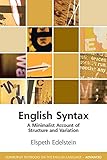English Syntax : A Minimalist Account of Structure and Variation / Elspeth Edelstein.
Material type: TextSeries: Edinburgh Textbooks on the English Language - Advanced : ETELAAPublisher: Edinburgh : Edinburgh University Press, [2022]Copyright date: ©2020Description: 1 online resource (288 p.)Content type:
TextSeries: Edinburgh Textbooks on the English Language - Advanced : ETELAAPublisher: Edinburgh : Edinburgh University Press, [2022]Copyright date: ©2020Description: 1 online resource (288 p.)Content type: - 9781474425537
- 425 23
- PE1361 .E34 2020
- online - DeGruyter
| Item type | Current library | Call number | URL | Status | Notes | Barcode | |
|---|---|---|---|---|---|---|---|
 eBook
eBook
|
Biblioteca "Angelicum" Pont. Univ. S.Tommaso d'Aquino Nuvola online | online - DeGruyter (Browse shelf(Opens below)) | Online access | Not for loan (Accesso limitato) | Accesso per gli utenti autorizzati / Access for authorized users | (dgr)9781474425537 |
Frontmatter -- Contents -- Acknowledgements -- Note on companion website -- Glossary -- 1 Got grammar? -- 2 Phrase structure -- 3 Lexical verbs -- 4 Auxiliary verbs and functional structure -- 5 Embedded clauses and questions -- 6 Negation -- 7 Non-finite complements -- 8 Nouns and determiners -- 9 Adjectives and adverbs -- 10 Minimalism and microvariation -- Bibliography -- Index
restricted access online access with authorization star
http://purl.org/coar/access_right/c_16ec
Delivers a firm grounding in the tools of syntactic analysis using a minimalist frameworkApplies the Minimalist framework to data from a number of varieties of EnglishEach chapter includes a ‘pre-Minimalist’ section, highlighting differences between the Minimalist framework and previous syntactic theoryEach chapter works through an example of a ‘puzzling’ syntactic phenomenon Exercises focus on English and include at least one ‘Beyond English’ exerciseIncludes a glossary of key terms and additional materials will be available onlineDo you find the technical architecture of theoretical syntax intimidating? Are you grappling with a great deal of unfamiliar linguistic examples? This textbook will introduce you to the main aspects of Minimalist syntax through the use of data from a number of varieties of English. In doing so it will equip you with a firm grounding in tools of syntactic analysis, while demonstrating the potential for variationist linguistics and theoretical syntax to feed into each other. Through examples and exercises, this textbook demonstrates that all varieties of language are rule-based and can be observed and described systematically, regardless of how ‘standard’ or socially valued they are.
Mode of access: Internet via World Wide Web.
In English.
Description based on online resource; title from PDF title page (publisher's Web site, viewed 27. Jan 2023)


